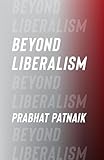Beyond liberalism / Prabhat Patnaik.
Series: Columbia themes in philosophyPublisher: New York : Columbia University Press, 2024Description: ix, 297 pages 22 cmContent type:- text
- 9780231216326
- 323 23/eng/20240222
- HB72 .P279 2024
| Item type | Current library | Shelving location | Call number | Materials specified | Status | Notes | Barcode | |
|---|---|---|---|---|---|---|---|---|
 BOOKs
BOOKs
|
National Law School | General Stacks | 323 PAT (Browse shelf(Opens below)) | PB | Available | Recommended by Dr. Manpreet Singh Dhillon | 39983 |
Browsing National Law School shelves,Shelving location: General Stacks Close shelf browser (Hides shelf browser)
Includes bibliographical references and index.
Introduction -- Some misconceptions in economics -- John Locke on hired labor -- Adam Smith and the division of labor -- Historical evidence on land productivity -- Neo-classical economics and "rationality" -- Keynes and the socialization of investment -- Capitalism : its specificity and origins -- Competition under capitalism -- Imperialism or economic co-operation? -- Capitalism in its spontaneity and appearance -- Freedom in the era of globalization -- The struggle for individual freedom -- Socialism and individual freedom.
"Political philosophy provides the basis for political praxis; it requires a functional understanding of society in which the economy is an extraordinarily significant component. This is no less true of Marxism than it is of liberalism: it is all at once a political philosophy and an analysis of political economy, both of which are oriented toward and motivated by an agenda of human engagement. Often obscured by the complexities of Marxian analysis is the nature of its critique of liberalism, which preceded it and to which it was intended as both a theoretical and practical response. Beyond Liberalism offers a detailed elaboration of that critique, restoring to a central position the long history of imperialism that has been at the heart of capitalism since its inception and explicating Marxism's relevance to the contemporary era of globalization, in particular financial globalization. The dramatic opposition between the two political theories turns heavily on their differential perspectives on individual freedom. The book provides a corrective to the common misperception that, while liberalism is concerned with such freedom, Marxism and the socialist agenda it advances emphasize instead a contrasting sphere of the collective. Prabhat Patnaik argues that liberalism and Marxism give very different analyses of the status of the individual within capitalism and that the Marxist alternative leads to the conclusion that the freedom of the individual can be realized only by means of an upheaval of capitalism through collective action. It is as relevant to Keynesian social democracy, marked by state intervention to alleviate conditions of unemployment, poverty, and inequality, as it is to classical liberalism. In the latter the functioning of the capitalist system constrains individual freedom; in the former, on the capacity of the state to intervene, which is especially apparent in our era in which finance is globalized but states remain national. Capitalism requires a degree of unemployment, for example, to limit wages and maintain the accrual of surplus value. The system also tends toward the centralization of capital, augmenting the power imbalance of global corporations over nation-states and the coercion of individual agency. It is only through the overturning of the system and the adoption of a socialist system that individual freedom and economic equality can be fostered"-- Provided by publisher.
There are no comments on this title.







